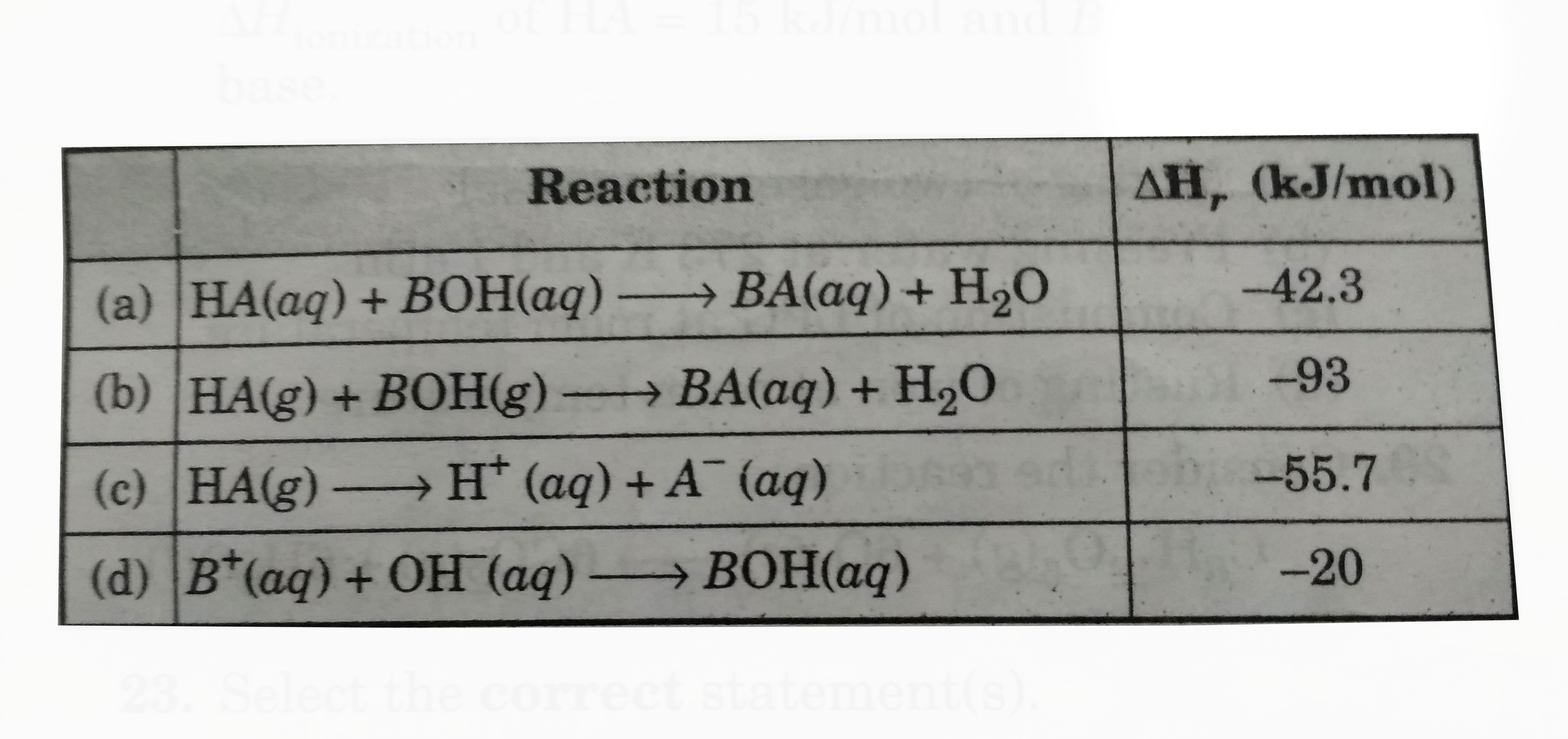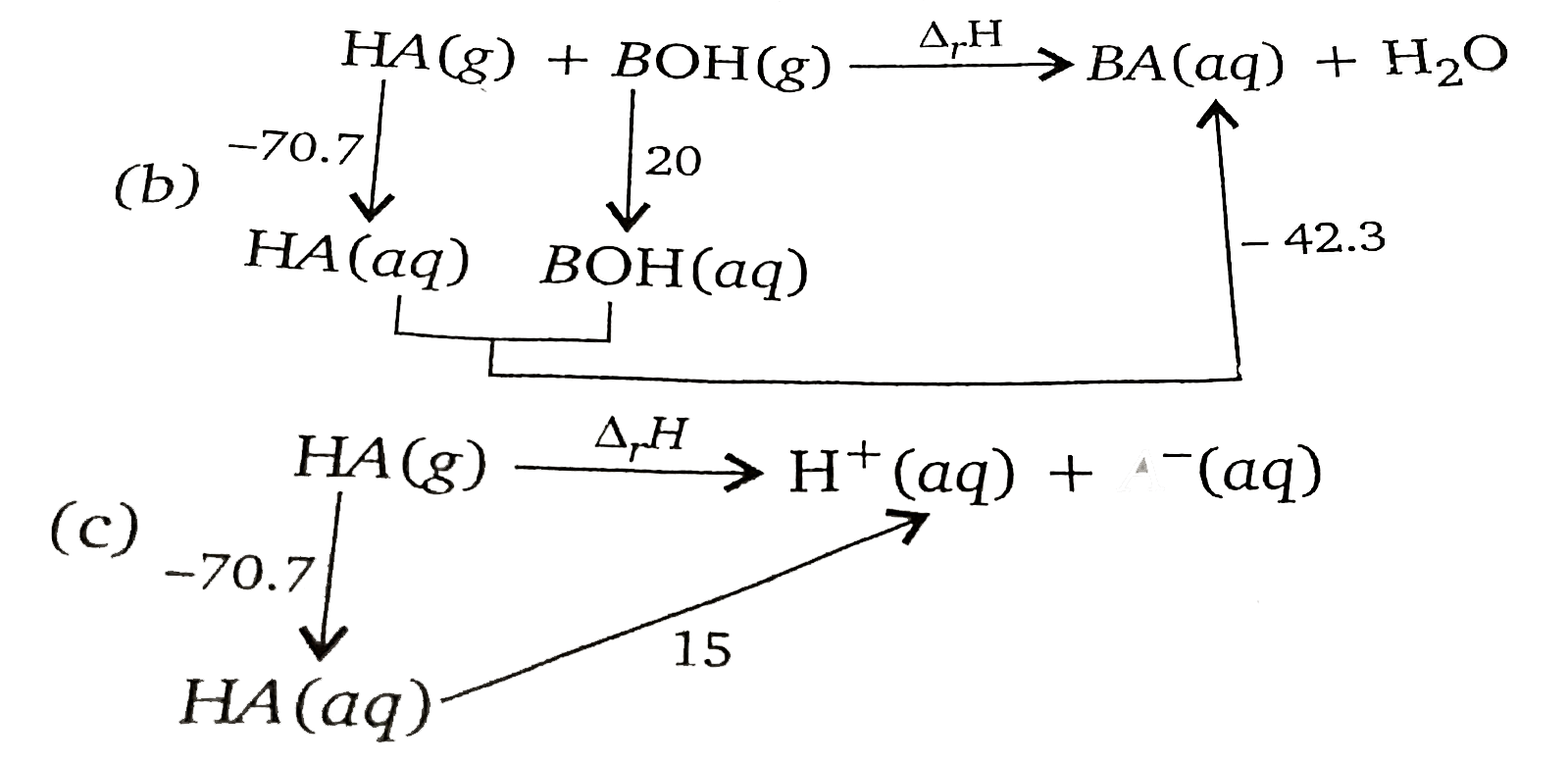From the following date , mark the opation(s) where ΔH is correctly written for the given reaction .
Given: H+(aq)+OH−(aq)→H2O(l),
ΔH=−57.3kJ
ΔHsolutionHA(g)=−70.7kJmole
ΔHsolutionBOH(g)=−20kJmole
ΔHionzatoin of HA=15kJ/mole and BOH is a strong base.

Reaction ΔrH(kJ/mol)
HA(aq)+BOH(aq)→BA(aq)+H2O −42.3
Reaction ΔrH(kJ/mol)
HA(g)+BOH(aq)→BA(aq)+H2O −93
Reaction ΔrH(kJ/mol)
HA(g)→H+(aq)+A−(aq) −55.7
Reaction ΔrH(kJ/mol)
B+(aq)+OH−(aq)→BOH(aq) −20
The correct Answer is:A, B, C
(a)ΔrH=15+0−57.3=−42.3 kJ
HA(g)+BOH(g)ΔrH−−→BA(aq)+H2O

ΔrH=−70.7+15=−55.7
(d)B+(aq)+OH−(aq)→BOH(aq)
ΔrH=0
Topper's Solved these Questions
Similar Questions
For the reaction,
Zn(s)+2HCl(aq)→ZnCl2(aq)+H2(g),ΔH is equal to ΔE.
View SolutionFor the reaction,
2H2(g)+O2(g)→2H2O(g),ΔH=−573.2kJ
The heat of decomposition of water per mole
View SolutionWhat is the enthalpy of neutralization of HF against a strong base?
Given : H+(aq)+OH−(aq)→H2O(l),ΔrH∘=−56kJ/mol
ΔsH∘(HF,aq)=−329kJ/mol,ΔsH∘(H2O,l)=−285kJ/mol
ΔsH∘(F−,aq)=−320 kJ/mol
View SolutionState whether each of the following processes is exothermic or endothermic : HCl(aq)+NaOH(aq)→NaCl(aq)+H2O(l),ΔH=−57.1kJ
View SolutionH2O(g)→H2O(l),ΔH=−40.7kJ
ΔH is the heat of……………….of water.
View SolutionH2(g)+12O2(g)→H2O(l),ΔH=−286kJ
2H2(g)+O2(g)→2H2O(l),ΔH=…kJ
View SolutionHCI+NaOH→NaCI+H2O,ΔH=−57.1kJmol−1
ΔH is the heat of ……………….of HCI and NaOH solution.
View SolutionH2O(l)→H2O(s),ΔH=−6.01kJ
ΔH is the heat of ……………….of water.
View SolutionWhenever an acid is neutralized by a base, the net reaction is
H⊕(aq)+¯¯¯OH(aq)→H2O(l)(l),ΔH=−57.1kJ.
Calculate the heat evolved for the following experiment?
0.50 mol of HCl solution is mixed with 0.30 mol of KOH solution.
View SolutionH2O(l)→H2O(g),ΔH=+40.7kJ
ΔH is the heat of ……………..of water.
View Solution
